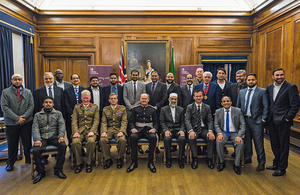Mosque signing paves way for Muslim-owned businesses to support Armed Forces
The Karimia Mosque in Nottingham has today signed the Armed Forces Covenant, ushering in a wave of Muslim-owned businesses which are now committed to supporting members of the military.

Crown copyright. All Rights reserved
A Nottingham Mosque has today signed the Armed Forces Covenant, ushering in a wave of Muslim-owned businesses which are now committed to supporting members of the military.
The Karimia Mosque and Institute put pen to paper in a significant moment today, formally recognising the important role which the Armed Forces play in the UK and abroad and supporting their work.
The commitment has already had a big impact across Nottinghamshire, with 16 local Muslim-owned businesses, from taxi firms like DG Cars to cargo companies such as MSA Transport, following the Mosque’s lead by signing the pledge which the government enshrined in law as a promise from the nation that the Forces community will be treated fairly.
As well as formalising their support for the Armed Forces, those businesses will now help personnel by looking to employ veterans and facilitating the needs of Reserves with support and appropriate levels of leave to work and train.
In attendance at the signing, Defence Minister Mark Lancaster said:
Karimia Mosque’s support is incredibly significant for the proud relationship between our Armed Forces and the > Muslim community, and it has already paved the way for Muslim-owned businesses across Nottinghamshire to follow suit. That means opportunities for our people, and that these businesses will benefit from the unique skills and experience which the military community offers.
Dr Musharraf Hussain, Chief Imam and CEO Karimia Institute, said:
We believe that the defence and security of our country is an important job. Those engaged in that task must be respected, supported and appreciated. Muslims are one of the youngest communities in Britain therefore we are encouraging them to join and play their role in defending our country.
Thousands of Muslims died for Great Britain during the First and Second World Wars. I think, by signing the Covenant, we are honouring those heroes too. We are making a solemn promise to show and encourage support for the Armed Forces community. We want the Muslim community to recognise and remember the sacrifices the Armed Forces have made and continue to do so.
The signing of the Covenant will build on the strong ties already established between the Karimia Mosque and Institute and the Armed Forces, particularly 7th Infantry Brigade, based at Chetwynd Barracks, Chilwell.
Commander of 7th Infantry Brigade, Brigadier Charlie Collins was also in attendance at the event. He said:
We have built a strong friendship with Dr Hussain and members of the Karimia Institute. Recently we enjoyed hosting two separate weekend events where the Muslim community spent time with our Reservists and Army Cadet Adult Instructors to find out about life in the Army and the Army Cadet Force. I am sure that going forward, we will be able to do a lot of great work together.
The news is another example of the Armed Forces Covenant in action and coincides with this week’s publication of the Covenant Annual Report, which highlights achievements from the past 12 months and outlines targets for the coming year.
Some of the successes delivered through the Armed Forces Covenant over the last year include:
-
Over 9,000 personnel benefiting from the Forces Help to Buy scheme, to the sum of approximately £136 million.
-
86% of the UK’s motor insurance industry committing to waive cancellation fees and preserve no claims discounts for up to three years when personnel and their families are posted abroad.
-
A network of nearly 200 Armed Forces Covenant champions was introduced across Forces units to act as the focal point for their local community and to help deliver information about the Covenant directly to personnel and their families.